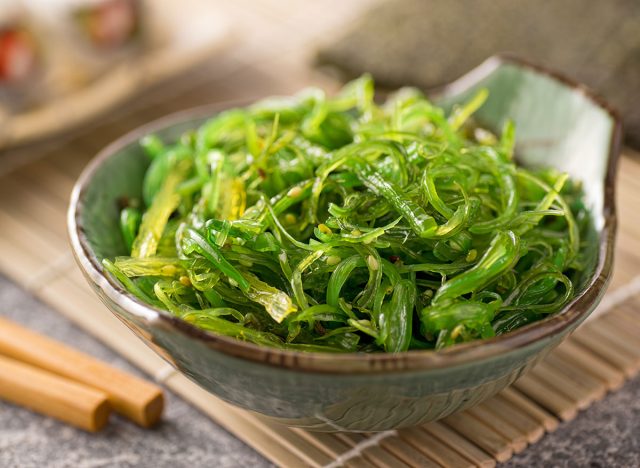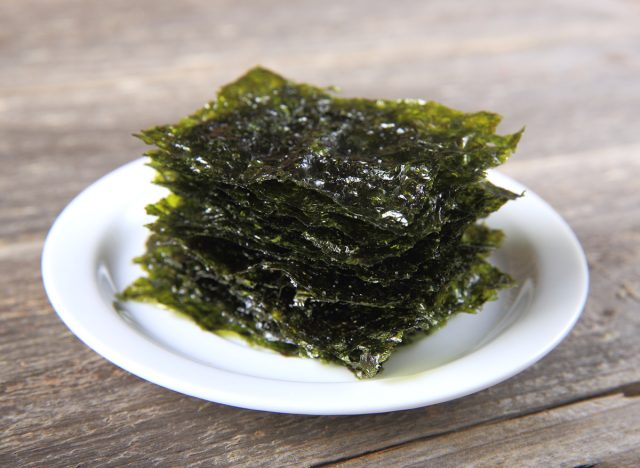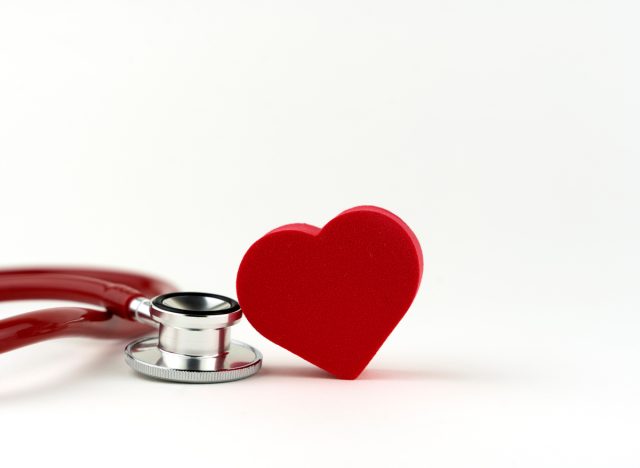Seaweed is more than the green stuff that you see floating in the ocean. Also known as "sea lettuce," seaweed can actually be eaten as part of your diet. In fact, seaweed has dated back to the 4th century in Japan and the 6th century in China as a food source. Today, these two countries, along with the Republic of Korea, are the top 3 countries that eat seaweed as food. It is also becoming more and more popular in the diets of other countries around the world, such as America, where it's often eaten as a roasted seaweed snack.
Seaweed can taste very salty, so it may take some getting used to if you want to try it, but if eating this leafy green seems totally preposterous, you may want to take a look at what can happen to your body when you eat it. We spoke with nutrition experts to give us insight into the surprising effects, both negative and positive, of eating seaweed.
You'll get plenty of iodine.

Seaweed contains an essential mineral—iodine—and is one of the best food sources of it, serving up 77% of your daily value of the nutrient in just 2 tablespoons of dried nori. Iodine plays a key role in thyroid hormone function, and these hormones regulate biological processes like your metabolism.
You can get iodine from fish, yogurt, oysters, milk, iodine-enriched bread, and iodized table salt, but seaweed is a delicious alternative.
"Seaweed can be helpful for people who don't eat much iodized table salt, seafood, or dairy," agrees Sarah Anzlovar, MS, RDN, LDN, owner of Sarah Gold Nutrition, a virtual private practice outside of Boston, MA.
However, it's important to watch what type of seaweed you consume (that's right, there are several).
"Some forms of seaweed can contain very large amounts of iodine," explains Mitri. "And if you overdo it, it can lead to thyroid problems like swelling around the neck and weight gain."
"Too much iodine, even from food, can lead to thyroid problems or exacerbate existing hypothyroid," Anzlovar further suggests. "The amount of iodine varies by type, but 1 cup of most seaweed contains all you need for a day. Kelp, dulse, and kombu are on the higher end, so be mindful of how much you're consuming—more isn't always better."
You get a boost of important nutrients.

"Seaweed is essentially vegetables of the sea," explains Anzlovar, "and it contains a number of essential vitamins and minerals including vitamin C, calcium, potassium, folate, thiamine, riboflavin, copper, iron, iodine, and magnesium."
Not only that, but Melissa Mitri, MS, RD, founder of Melissa Mitri Nutrition also says that seaweed has the unique ability to absorb and store minerals in concentrated amounts.
"While these minerals are essential in our diet, seaweed can sometimes contain large amounts of toxic heavy metals like cadmium, mercury, and lead," says Mitri. "This is only a potential concern if you eat seaweed very regularly."
Mitri suggests that if you do consume seaweed often, choose organic seaweed if possible. Typically, organic seaweed contains fewer heavy metals.
It may improve gut health.

If you're looking to better your gut health, you might want to try adding seaweed to your diet.
"Seaweed is rich in fiber and sugars called polysaccharides that support gut health and increase the growth of 'good' gut bacteria," says Mitri. "They do this by producing short-chain fatty acids, which help nourish healthy gut bacteria and enable them to thrive."
You could reduce your risk of heart disease.

"Eating seaweed has been linked to lower cholesterol and reduced risk of coronary heart disease," says Anzlovar.
In a journal article published in Nutrition Reviews, consuming seaweed may play an important role in changing the impact of chronic diseases, such as cardiovascular disease (CVD) and related risk factors.
According to the review, a collaborative cohort study showed that Japan had a lower mortality risk. This is suggested to be because of the consumption of seaweed. The study suggested the typical Japanese dietary pattern, which includes eating seaweed, is associated with decreased CVD risk.
No comments:
Post a Comment